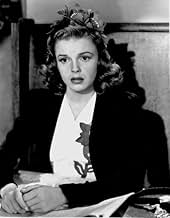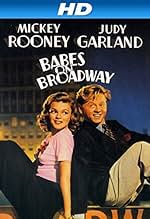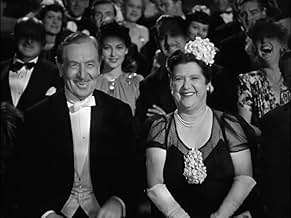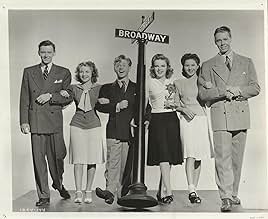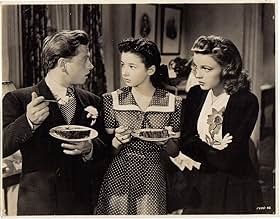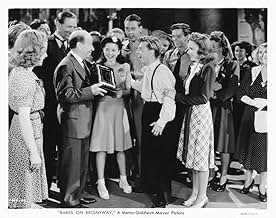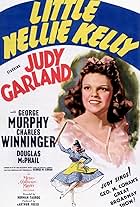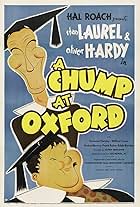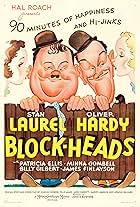Penny Morris and Tommy Williams are both starstruck young teens but nobody seems to give them any chance to perform. Instead, they decide to put up their own show to collect money for a summ... Read allPenny Morris and Tommy Williams are both starstruck young teens but nobody seems to give them any chance to perform. Instead, they decide to put up their own show to collect money for a summer camp for the kids.Penny Morris and Tommy Williams are both starstruck young teens but nobody seems to give them any chance to perform. Instead, they decide to put up their own show to collect money for a summer camp for the kids.
- Nominated for 1 Oscar
- 1 nomination total
- Man
- (scenes deleted)
- Elinor Downing, War Refugee
- (uncredited)
- Butch
- (uncredited)
- Mrs. Crainen, the Matron
- (uncredited)
Featured reviews
What seems to get the most reaction here on IMDb is not surprisingly the minstrel number at the close of the show with all of the actors in blackface. Yes it's dated and offensive but some of the comments here are way over the top. One imbecilic individual even said Mickey Rooney shouldn't have been allowed to work again! Put the Kool-Aid down, kid.
But it amuses me to see young commentators expressing "shock" and dismay at the blackface routines shown in the big finale. They never knew how popular minstrel shows were, even into the 1940s? Where have they have been living? They never heard of Al Jolson and how he rode to stardom on his blackface routines?
The film actually rises above its clichéd plot whenever Judy takes the spotlight with a song. Never has she looked so radiantly youthful and vibrant. Rooney, while of course obviously talented, tends to ham it up a bit too much whenever he's given the spotlight, which is a little too often for my taste. Fay Bainter does nicely as a patron of the arts while James Gleason gets on the nerves with his frustrated bit as a producer.
Amusing to see gangly RICHARD QUINE hoofing it up (before he became a film director). The standout dancer is Ray MacDonald, the fresh faced kid who lights up the screen whenever he dances, resembling, in style and acting technique, Donald O'Connor. Tragically he, like others in the cast, ended his life much too soon.
Judy and Mickey do a fabulous version of "How About You?" and Buby Berkeley's genius at staging intricate dance routines is nowhere more evident than in the "Hoe Down" number, probably one of the catchiest of all the musical routines.
There are slow spots and the film could easily have omitted footage to pare it down to a running time of, say, an hour and forty minutes. As it is, you have to be willing to stick with it for the full two hours, something only likely to occur if you're a true fan of Garland and Rooney.
You can catch a brief glimpse of two up and coming stars, Margaret O'Brien and Donna Reed. Reed has a brief moment as a receptionist.
Trivia note: Shirley Temple was originally considered for the Virginia Wiedler role. Might have been OK too, since the part is not that demanding musically and Temple could certainly still do the required amount of hoofing.
'Babes on Broadway' is my least favourite of their musicals ('Babes in Arms' had its problems but was a little better as an overall film regardless of its bowdlerised treatment of the musical), but Garland and Rooney and their chemistry are what saves the film. It works well as a musical, but fares problematically as an overall film, one can totally see the appeal but there are definitely understandable reasons as to why it won't click with others.
The story is very contrived and the sentimentality and corniness went well overboard in places. Was willing to forgive that it was structurally thin, the contrivances and problematic tone less so. There is some wartime patriotism which feels both out of place (tonally it feels odd with the rest of the film) and heavy-handed, and some of the editing is on the bloated side, some of it not serving much relevance to the story.
Unsurprisingly, the biggest criticism that 'Babes on Broadway' has gotten is regarding the "black-face" finale. Some of the criticism here has been over-the-top and I have seen plenty of classic period musicals to know that black-face routines were common at the time (it's very like being familiar with racial stereotypes in cartoons), still doesn't stop me not particularly caring for them. Wasn't offended as such here, but the finale did come over as overblown, rather tasteless and it has aged badly (even when judging it by 1941 standards and not by 2017 standards).
However, even when not in Technicolor, 'Babes on Broadway' still looks lovely in crisp black and white and with elegant production design. As said, on the musical front (production values, songs, vocal performance, arrangements, choreography and dancing) 'Babes on Broadway' fares significantly better. The songs are very pleasant and lively, "How Are You", "By the Light of the Silvery Moon" and "Hoe Down" faring best, "Chin Up, Cheerio" is enthusiastically performed but a bit patronising. The choreography mostly has energy and tenderness, really appreciated "Hoe Down's" intricacy.
Of the humour, Rooney's hilarious and pretty amazing impression of Carmen Miranda is a big standout. Garland does well too with her imitation of Sarah Bernhardt. Some nice fun wit and charm in the script, and Berkeley directs more than competently. 'Babes on Broadway' more often than not has a lot of energy and charm.
Fay Bainter, James Gleason and Donald Meek are very good in their roles (then again they could phone in a performance and still be good), and Margaret O'Brien is adorable in a short pre-fame appearance. Ray McDonald's dancing is pretty incredible. At the end of the day though it is Rooney and Garland that make 'Babes on Broadway' worth watching. Rooney clearly has fun, even if he does overdo it at times, while Garland, on radiant and touching form, is even better. Their chemistry is wonderful.
Overall, uneven film but Rooney and Garland delight hugely. 6/10 Bethany Cox
Storyline
Did you know
- TriviaVincente Minnelli conceived and supervised the "Ghost Theater" sequence where Garland and Rooney imitate theatrical notables of the past.
- GoofsWhen Alexander Woollcott is introducing the story, at one point his bow tie disappears and his collar is open.
- Quotes
Maxine, Little Girl at Audition: Please wait, don't send my brother to the chair, don't let him burn, please, please warden, please.
- Alternate versionsSome older television prints of the film delete the minstrel show finale.
- ConnectionsEdited into Hollywood: The Dream Factory (1972)
- SoundtracksBabes on Broadway
(uncredited)
Music by Burton Lane
Lyrics by E.Y. Harburg
Played and sung by a chorus during the opening credits
Reprised as a production number with the principal cast near the end
Sung and danced to by Judy Garland and Mickey Rooney in blackface
Danced to by Ray McDonald in blackface
- How long is Babes on Broadway?Powered by Alexa
Details
Box office
- Budget
- $940,068 (estimated)
- Runtime1 hour 58 minutes
- Color
- Aspect ratio
- 1.37 : 1
Contribute to this page



